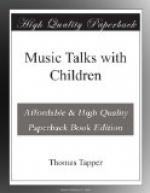As we go on in our school education, taking up new studies, we find to a still greater degree that what we learn is for usefulness. Arithmetic becomes mathematics in general. Grammar is brought before us in other languages, and branches out into the study of Rhetoric and Literature. History is taught us of many lands, particularly of Greece, Rome, and England. And, bit by bit, these various histories merge into one, until, perhaps not until college years or later, the doings of the countries in all the centuries of which we have knowledge is one unbroken story to us. We know the names of lands and of people. Why Greece could love art, why Rome could have conquest; why these countries and all their glories passed away to give place to others; all these things become clear to us. We learn of generals, statesmen, poets, musicians, rulers. Their characters are made clear; their lives are given to us in biography, and year after year the story of the earth and man is more complete, more fascinating, more helpful to us in learning our own day.
Then, besides all these studies, we are taught to do things with the hands. After the Talks we have already had about doing, we know what it means to have training of the hands. It really means the training of the thoughts. We are training the mind to make the hands perform their tasks rightly. It is the same in the science lesson which teaches us to see; actually to use our eyes until we see things. That may not seem to be a difficult task, but there are really very few people who can accurately and properly use their eyes. If there were more, fewer mistakes would be made.
Thus we can see that school work divides its tasks into two general classes:
First, the learning of facts.
Second, the actual doing of things.
You will readily see that to do things properly is possible only when we know facts which tell us how to do them. That shows you at once the wisdom of the education you receive.
Now, let us imagine that school life is over. For many years you have gone faithfully every day to your place, you have done your tasks as honestly as you could, and said your lessons, being wounded no doubt by failures, but gladdened again by successes. Now, when it is all over, what is there of it?
Well, above all things, there is one truth of it which it is wonderful people do not think of more frequently. And that truth is this: The only education we may use in our own life is that which we have ourselves. No longer have we help of companions or teachers. We depend entirely upon our own personal knowledge. If we speak it is our own knowledge of Grammar that is used. We cannot have a book at hand in order to know from it the words we should use. If we make a calculation about money, or do anything with numbers, it must be done from our knowledge of Arithmetic, and it must be right or people will very soon cease to deal with us. Then, if we have a letter from a friend, we must of ourselves know how to read it, and if we have aught to say to another at a distance, we must be able clearly to express ourselves in writing, so that we may make no mistake in our meaning.




